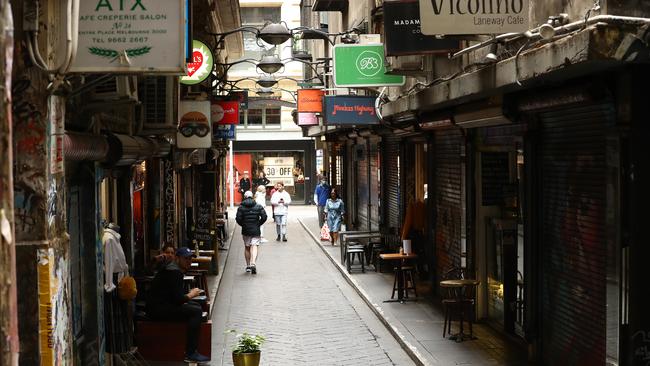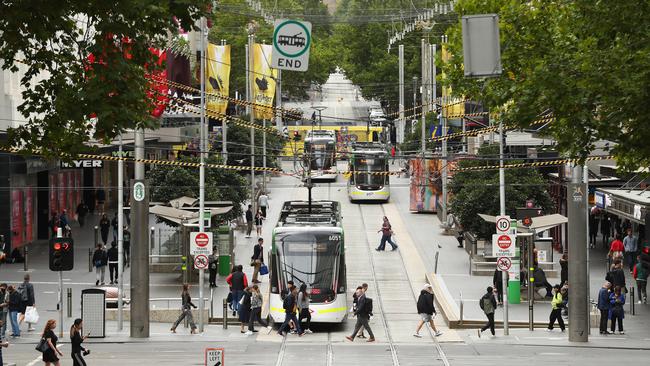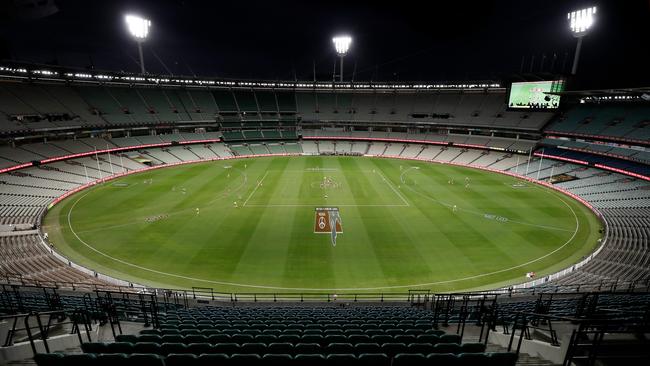Where to shop, what’s open: Your coronavirus lockdown questions answered
As Australia prepares to shut up shop ahead of a rolling shutdown beginning today, these are the questions Victorians are asking. Here are the places where you can still shop and visit — and tips and tricks to survive self-isolation.
VIC News
Don't miss out on the headlines from VIC News. Followed categories will be added to My News.
This coronavirus article is unlocked and free to read in the interest of community health and safety. For full access to the Herald Sun/Leader journalism, subscribe here.
Can my kids go to school?
Victorian public schools will be closed from Tuesday, March 23. At this stage, term two will begin on Wednesday, April 15, with teachers to return on April 14 — but that could change. School holidays were due to start this Friday.
Can I go to work?
Workplaces and offices must follow the same social distancing arrangements, but can remain open.
Where can I buy food?
Supermarkets will remain open, with freight services to continue to ensure there are adequate supplies. Butchers, bakers, greengrocers and other fresh-food stores will also remain open.
Can I go out for dinner or to the pub?
No. Hospitality businesses are not essential services and will not be allowed to seat patrons. But cafes and restaurants can serve takeaway meals.
Can I buy drinks from the bottle shop?
Bottle shops will stay open for now and can also continue online deliveries.
Where can I buy medicine?
Pharmacies are considered an essential service and will remain open.
How do I get medical help?
Health services — including hospitals and GPs — are essential and will keep operating.
Can I go outside or do I have to stay home?
You can still go outside but future closures will result if people ignore social distancing requirements and begin congregating in groups.
How do I get around?
Petrol stations will remain open, although all non-essential travel is discouraged. Public transport is also expected to continue operating as normal.
Can I go shopping?
Shopping centres remain open, and retail stores are expected to close from Wednesday, with some already shutting their doors. Shoppers can continue selling products online.
Will my rubbish be collected and my mail be delivered?
Yes. Both are considered essential services. Post offices likely to stay open.
Can I travel interstate?
Australians are urged to cancel all non-essential domestic travel, including Easter holiday trips. Travellers entering WA, SA, Tas and the NT have to self-isolate for 14 days.
— Ask the Expert is on again today, this time with child psychologist Michael Carr-Gregg at 12pm AEDT. Follow here
TIPS, TRICKS TO SURVIVE SELF-ISOLATION
CLEANING
COVID-19 can live on plastic for up to 72 hours, steel for up to 48 hours, cardboard for up to 24 hours and copper for up to four hours, according to a recent study.
Frequently touched surfaces, such as doorknobs, bathroom fixtures, toilets, phones, keyboards and bedside tables, should be cleaned at least weekly.
If anyone in your home is sick, these surfaces should be cleaned daily.
Start cleaning in the cleanest area and finish in the dirtiest area to avoid cross-contamination.
Linen should be regularly washed in hot water.
Do not touch used linen against your clothing while carrying. Use a laundry basket or similar.
Mechanical cleaning with detergent and water, followed by rinsing and drying, is the most effective method for removing germs from surfaces.
Disinfectants are only necessary if a surface has been contaminated.
If cleaning a room where someone with COVID-19 has been, use a 1000ppm bleach solution to clean surfaces and ensure you are wearing appropriate personal protective equipment such as a disposable apron, gloves, a mask and goggles.
Source: Queensland Health, study from NIH/Princeton/UCLA

SUPERMARKETS
If you can, visit supermarkets only when necessary and consider buying food online or takeaway instead.
If going to the shops is unavoidable, try to go in quieter periods.
Woolworths and Coles have hygiene stations in stores around the country which contain disinfectant wipes for customers to clean their trolleys and baskets.
You do not need to wear a face mask when in public if you are healthy. The Australian Government advises, while masks can help prevent transmission from infected patients to others, they are not recommended for healthy members of the public.
Practice social distancing measures when in public, including at the supermarket.
These include staying home if you are unwell and keeping a distance of 1.5m between you and other people where possible.
Source: NSW Health, Australian Government Department of Health
PUBLIC TRANSPORT
Use public transport in off-peak periods if possible to stagger demand on the service.
If using public transport is unavoidable, ensure you practice social distancing and hygiene measures to reduce the risk of infection.
Use debit, credit and transport cards to pay your fare, as opposed to cash.
Wash your hands frequently before and after travel, do not travel if you are feeling unwell, try to avoid touching your face, cover your nose and mouth when you cough and sneeze, avoid using a mask if you are well and use an alcohol-based hand sanitiser with more than 60 per cent alcohol.
Source: Public Transport Victoria, NSW Health

FOOD DELIVERIES
Australia’s largest food delivery services – including Menulog, Uber Eats, Dominos, Crust and Pizza Capers – have already taken steps to stem the transmission of COVID-19 with contact-free delivery.
Uber Eats and Deliveroo are also offering financial assistance to drivers who test positive to COVID-19 or are forced to isolate for 14 days.
Food Standards Australia New Zealand (FSANZ) has advised it is “unlikely” COVID-19 can be transmitted through food.
As for food containers, a recent study found COVID-19 could survive on plastic for up to 72 hours and cardboard for up to 24 hours.
Professor Ramon Shaban, clinical chair of Infection Prevention and Disease Control at Westmead Hospital and the University of Sydney said while COVID-19 was not transmitted through food in an “ordinary sense”, the risk of contracting the virus from symptomatic food handlers or delivery drivers could be reduced by limiting surface contact.
“It’s not like we can expect that everything that gets delivered to our house is going to be contaminated,” he said.
“Adopting good hand hygiene is really very important when we interact with our environment and others.”
COPING WITH ISOLATION
Talk to other members of the family about COVID-19 to reduce anxiety.
Keep up a normal daily routine as much as possible.
Exercise regularly at home. Exercise is a proven treatment for stress and depression.
Ask your family, friends or other members of the household to pick up your groceries and medicines for you. If this is not possible, you may be able to order groceries and medicines online or by telephone.
Arrange to work from home.
Ask your child’s school to supply assignments or homework by post or email.
If you are sharing a home with others, as much as possible, you should remain separated, wear a surgical mask if you’re in the same room as another person, use a separate bathroom and avoid shared or communal areas.
Do not share a room with people who are at risk of severe disease, such as the elderly, or those with heart, lung or kidney conditions, or diabetes.
For more information and support while in home isolation, call the National coronavirus Health Information line on 1800 020 080.
Source: Australian Government Department of Health, NSW Health

ENDING ISOLATION
Can I get COVID-19 a second time?
To date, there is no evidence of COVID-19 recurring in a patient who has recovered from the condition.
Professor Ramon Shaban, clinical chair of Infection Prevention and Disease Control at Westmead Hospital and the University of Sydney explains: “We do have evidence that shows people who have COVID-19 develop antibodies, which is the human body’s response to an infection, and these antibodies are what the body uses to fight future infections”.
“We can feel quite confident that it behaves in many other ways that is characteristic of a respiratory virus and there’s been no evidence of recrudescence.”
What happens at the end of my 14-day isolation period?
If you have not developed symptoms by the end of the isolation period, you are able to re-enter the community. If you do develop symptoms within 14 days of returning to Australia, or within 14 days of last contact of a confirmed case, you should see a doctor immediately. You must remain in isolation until public health authorities inform you it is safe to return to your usual activities.
Source: Australian Government Department of Health
WORKING FROM HOME
It can be tempting to turn your bed into an office, dodge video calls, and work at whatever hour suits you but experts are warning Australia’s growing work-from-home army to avoid these pitfalls to stay productive and healthy.
While working from home will be easier for some more than others, they recommend establishing a home office, a routine, negotiating with housemates, and turning on the webcam during conference calls to maintain social contact.
Onya managing director Hayley Clarke, who manages a team of employees remotely, said life outside the workplace didn’t need to feel isolating, and many workers actually talk to clients and colleagues more during the day.
“I don’t have less communication working from home because I’m still talking to people on Skype or over the phone all day every day,” she said. “It might not be the same kind of chitchat that you get when someone drops into the office though, and you have to learn to read auditory cues more than visual cues.”
And Australian Institute of Management WA chief executive Professor Gary Martin recommended workers make sure they keep their computer’s video camera turned on when participating in video conferences and calls over platforms such as Zoom, Skype, Google Hangouts, GoToMeeting, Cisco WebEx, and Slack.
Face-to-face contact was an important part of staying socially connected, he said, though he warned workers to negotiate with others in the household who had also been sent home to work.
“Having a shared calendar about your commitments can help because you don’t want to have people invited over when you’re in the middle of a teleconference,” he said.
Ms Clarke said it was also important establish a dedicated work location at home, prepare daily task lists, and to set regular work times to keep your day on track.
“The biggest recommendation about working from home is just to start the day normally. If you just roll out of bed and stay in your PJs, it’s hard to stay motivated,” she said.
MORE NEWS
